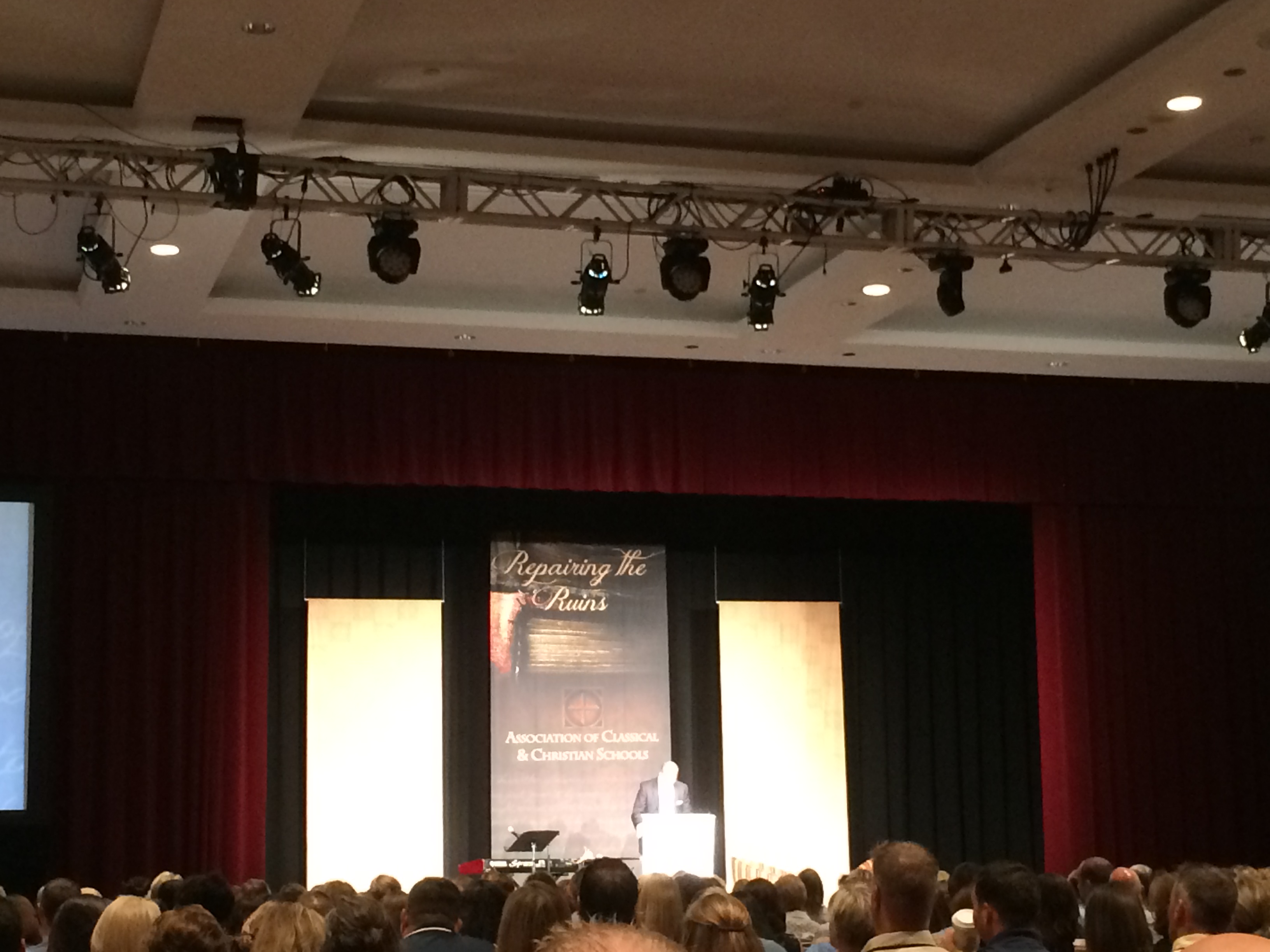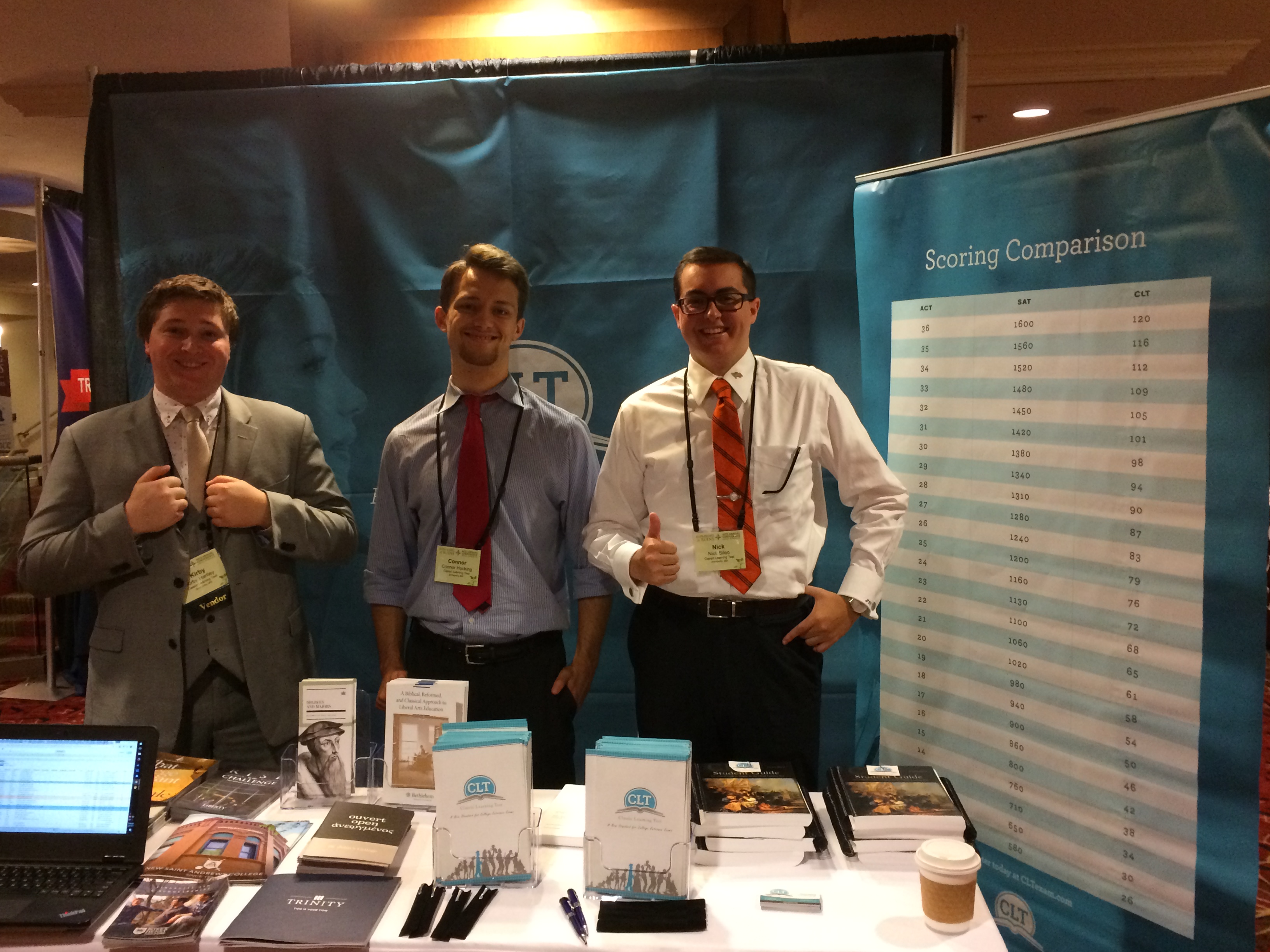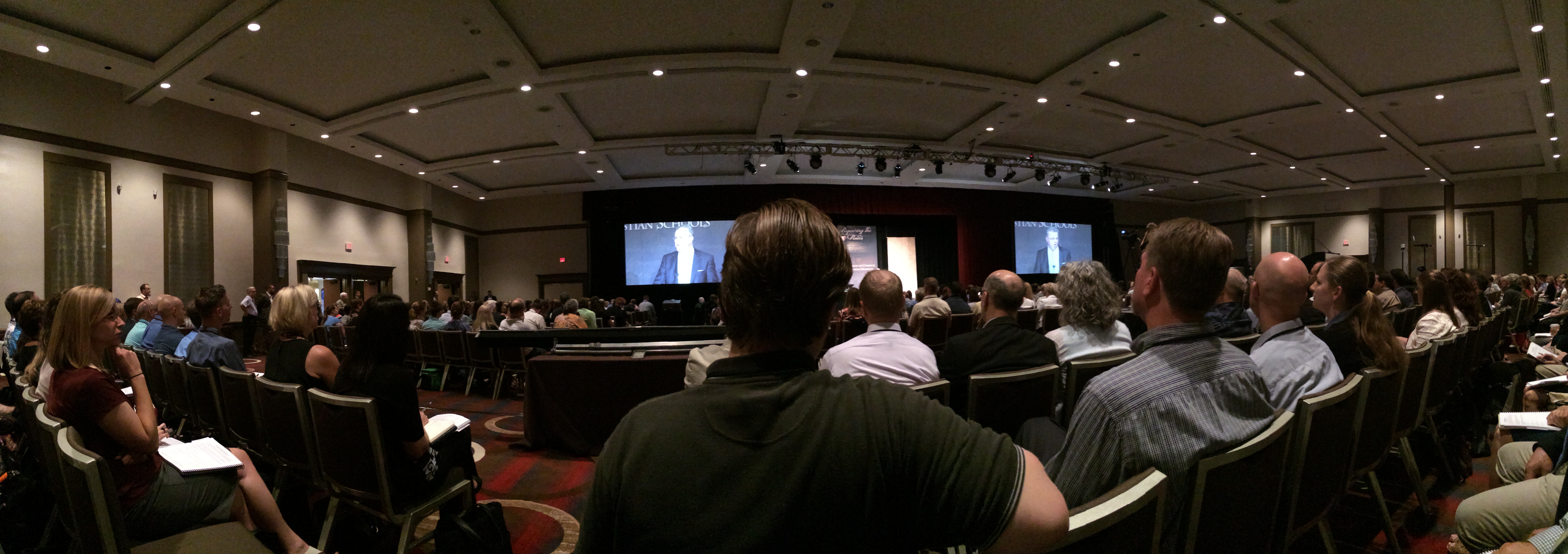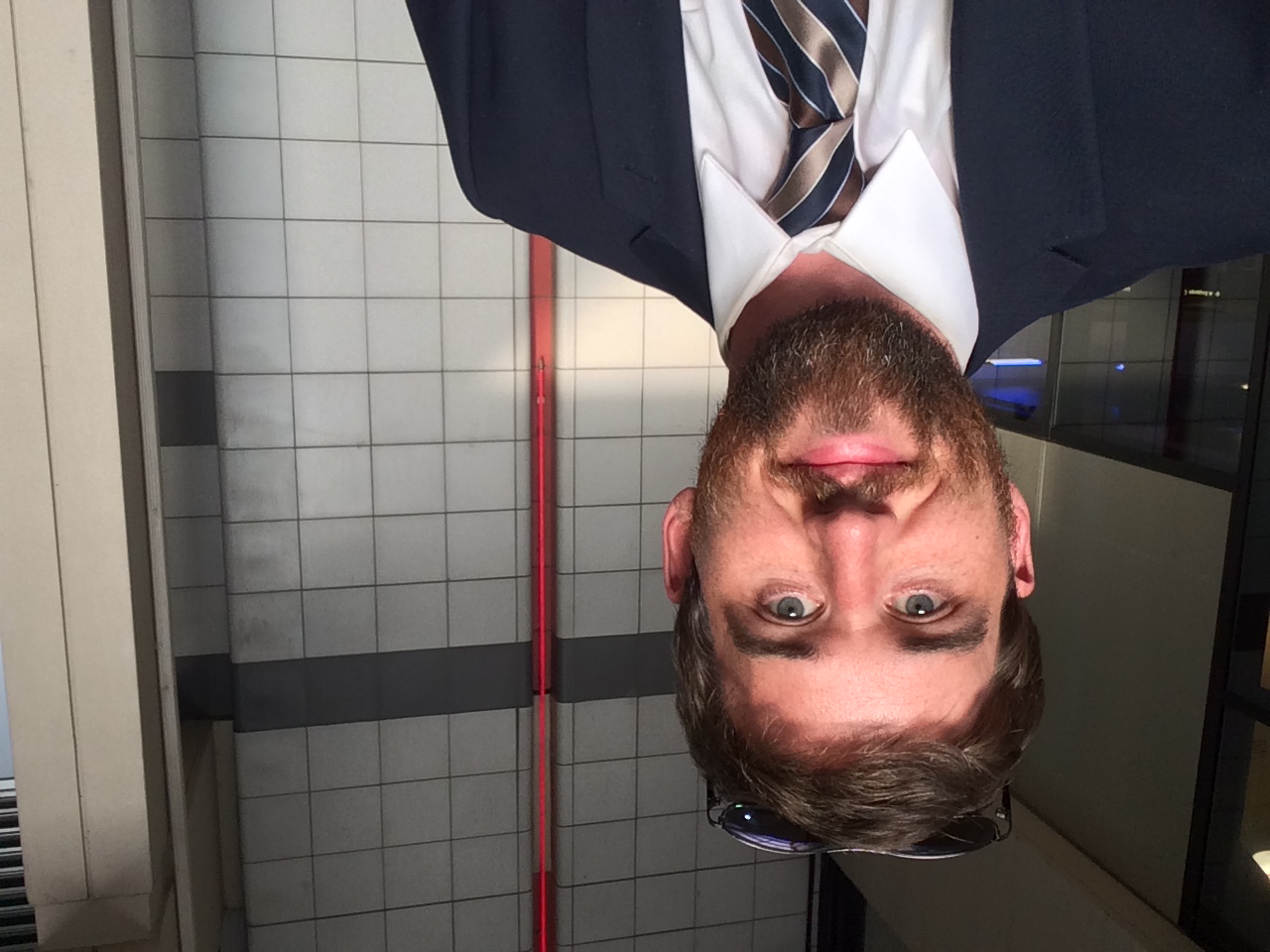Language, Beauty, and Standardized Tests at “Repairing the Ruins” 2017

In June 22-23, The Buhler Report attended and live-blogged several talks and workshops from the Repairing the Ruins Conference in Pittsburgh, PA.
“Repairing the Ruins” is put on by the ACCS and is the largest conference for classical Christian education in the nation. Sessions cover big ideas and practical details of classical education in our context today.
A few highlights
“Love is the movement out of narcissism.” –Louis Markos
God loves us by remembering us. We love God by remembering him. When forgetfulness begins, that marks the decline of love. – Douglas Wilson
“All things are made one in Christ, but that means not flattened into unity but harmonized. If all things are harmonized in Christ, then certainly all the curriculum must be harmonized in Christ.” –Andrew Kern
“Beautiful art redeems our fallen senses.” –Steve Turley
“You can have morality without religion. But you can’t have morality in large groups, sustained over time, across generations, without religion.” –Robert George
“No one will save education or save this generation in a time of turmoil if we do not. The eagles are not coming. Or rather, you are the eagles. And only God can destroy the ring.” – John Mark Reynolds
Read below for updates from:
- Louis Markos, “CS Lewis and the Psychology of Hell”
- Douglas Wilson, “Three Central Duties”
- “Telling the Story of the World”
- Andrew Kern “Memory, Imitation, Harmony”
- Turley, “Beauty Matters”
- Robert George, “Constitutional Structures”
- John Mark Reynolds, “Avoiding the Temptation to Christian Leninism”
- and more!
Friday, 3:00pm – Louis Markos, “CS Lewis and the Psychology of Hell”
We were a little bit late into Dr. Markos’ talk. However, picking up in media res…
Dr. Louis “Lou” Markos is discussing the psychology (not the theology) of hell in Lewis’ Great Divorce.
Markos’ first point is that hell less like a pit you fall in all at once; hell is more like a swamp or marsh you edge into, little sin by little sin.
Hell was not intended for humans. The Bible says as much pretty explicitly. Matthew 25 says, in passing, “Depart from me, you who are cursed, into the eternal fire prepared for the devil and his angels.” So hell is a place for those who have sacrificed their humanity. It’s not that hell is a place for human beings who are beyond salvation; the problem is there is nothing left to save.
Markos is going to discuss three case studies from Lewis Great Divorce. He says Lewis is one of the great psychologists (as well as theologians, writers, apologists, literary critics).
The first is the case of the woman who grumbles so much she voluntarily chose hell, where she is able to grumble more. Lewis (through MacDonald) says she is not just “a grumbler” but she has become completely “a grumble.”
The second is the case of the painter who loves the techne of painting so much that he lost his first love. What he fell in love with was the “light behind the landscape” and now, in heaven, confronted by that light, the painter turned away. He made an idol of the paint.
“Love is the movement out of narcissism.” –Louis Markos
The third case is the unhappy person who tries to blackmail paradise. Markos says that heaven is above such pettiness. Lewis alludes to the Aesop fable of the dog in the manger, who will not eat the hay but will not let the cows eat it. Similarly, the unhappy brat, the cynical, the bitter, who cannot enjoy heaven himself wants to ruin it for everyone else. The doctrine of hell guarantees that he can’t blackmail paradise.
Markos said that one of the biggest lies is that satan makes people free to be themselves. In fact, satan makes people cookie cutter by badgering them with criticism and shame and self-hatred and despair. “Shatan” is Hebrew for “accuser.” He accuses. His accusations ruin all the fun. God makes people free to be themselves, and makes us happy. Go to a party where Jesus turns water into wine.
Friday, 2:00pm – Douglas Wilson, “Three Central Duties”
Douglas Wilson took the stage to a standing ovation of thanks from the crowd.
He expressed his gratitude to God for this movement.
His goal is to remind and to challenge the audience. Three points:
- Gratitude and remembrance
- Three kindnesses of God
- Central challenges that will be faced
On the first point, Wilson said to remember God’s blessing.
Gratitude is not what we fight for but fight with.
God’s blessings continue when we continue in gratitude.
God loves us by remembering us. We love God by remembering him. When forgetfulness begins, that marks the decline of love.
He thanked his wife, Nancy, for having the idea of restoring Christian private and home school education on the classical model. And he thanked his kids for loyalty in doing this form of education. His 17 (or so) grandkids too! He mentioned many people, including Marvin Olasky took a chance with the book “Recovering the Lost Tools of Learning” and Crossway books who published it.
He also has a challenge. Something could wreck your school: sin. Ego concerns, territory concerns, a lot of different kind of sins. Watch out for compromise, and especially watch out for forgetting.
- Don’t be too proud to learn from Catholic and Orthodox educators; but, Wilson said, don’t be ashamed of the glorious heritage of historic evangelical Protestantism.
- Don’t do low-carb classical. It can’t be surfacey, scratch and sniff, especially in assembling your board. Board members need to have the vision for truly and deeply classical education.
- Guard yourself from old idol of “respectability”. Guard yourself snobbery, boasting in awards handed out by the secular establishment, such as awards and scholarships and test scores. You want God to accredit your school. You want to show yourselves approved by God.
- When it comes to the LGBTABCD nonsense, Wilson said you must have titanium spines. The world is going to come to you and demand. Only have two bathroom signs: XX and XY, because the bathrooms are on the far end of the science wing. Reporters will ask about the transgender student who’s sad. Wilson said, hopefully the cameras are running, and he would say “Give me the student’s name and I’ll throw his ass out.” The audience grew silent. Wilson said there’s a point to the vulgarity: if you have more of a problem with the word “ass” than with the practices of “Metrosexual Classical Academy” then you have already compromised and don’t understand the severity of the situation. They will come after you with a club. They don’t know what love or hate is, but they will come for you. Don’t just fight the gender confusion issues, but don’t get close to Darwin, or anything that rhymes with Darwin, or anything that smells like Darwin. If you believe that anything can turn into anything else then you are a babe in the woods and you aren’t going to survive.
Wilson concluded with a quotation from Anthony Eselon about seeking the Kingdom first.
During the Q&A, Wilson was asked about what major objective students should have. Wilson responded that students should know how to think about the world to see through the magician’s tricks. They need to know what to think, how to think, and have rightly ordered love. For right thinking is grounded in love. You can’t think rightly about the world until you love the world. He was then asked about the ideal person coming out of our school. He said he can’t describe that person because he is not that person. We just have to walk in the spirit, love God and love each other, and fight sin.
Friday, 1:30pm – Oratory Contest
A student, Kana Turley(?) presented her fascinating paper about sacred and secular uses of food.
She is arguing that modernity since the industrial revolution has redefined food in anti-Christian ways. Our use of food leads to disconnect from creation, alienation from the body, and diet-culture eating. A Christian approach to food blesses creation and transforms ourselves and the world as an integrated whole, including blessing the content of our meals.
Friday, 9:50am – “Telling the Story of the World”
History is hard to do because of the “vexing relationship” between how we see the world and how we tell its story.
History has been done differently over time. Just as a scientist would never use Harvard’s science curriculum from 1850, but should know it, so a historian should not do history like Herodotus or Eusebius but should know it.
What has changed? A commitment to reductive explanations, a rejection of divine providence. Science is the “real method” for understanding not just natural world but everything, including human history. Out are metaphysics, divine, telos, familial, hierarchical; in are the empirical, open-ended, material, individual, and flat.
At one point, the goal was to be “unbiased” and “objective.” In many circles, that has changed. There is a postmodern crisis in history where any one with a bias and narrative (queer, Marxist, etc.) can do a legitimate “reading” of history.
How can Christian interventions solve this dilemma?
Jay Green identifies “Five Rival Versions” of Christian Historiography. (Examples: Marshall, Mark Noll)
- Historical study that takes religion seriously
- Historical study through the lens of Christian faith commitments (worldview)
- Historical study as applied Christian ethics
- Historical study as Christian apologetic
- Historical study as search for God
- Historical study as Christian vocation
Mark Noll’s providentialist matrix (from Jesus Christ and the Life of the Mind 2011).
General History General revelation and special revelation Christian events General revelation and special revelation
Radical proposals like Steven Keillor offer tentative interpretations of providence.
A twofold proposal:
- History as storytelling
- History as part of a story
History as storytelling. The Hayden White (1973) “Interpretation in History”, recommends presenting history as a plot structure with a sequence of events that reveals their nature as a story of a particular kind. Embrace it. Two people could tell the same 25 facts about the American Revolution as a romance of the victory of justice or as a tragedy of the victory of the oppressing class.
The discipline is that you have to stick to the facts. Doris Betts (Shouts and Whispers) knows that what you believe will sink into the facts like a stain.
If we see ourselves as storytellers, not just fact presenters, or researchers, we can connect with our students.
History as part of a story. History is dependent. It’s a branch of the tree of learning. Wendell erry “If we represent knowledge as a tree, we know that things are divided are yet connected.” We have a shared language in theology. Theology is a set of doctrines that help us tell stories better. What does the atonement look like not just in a theologian but in the world as a historical principle operating even now, as I speak. Then we can talk about what the civil war means. The great movements and actions of the church in history. As we study theology, we can incorporate other disciplines, anthropology, literature.
Veritas Press does this well.
Thursday, 4:20pm – Andrew Kern, “Memory, Imitation, Harmony”
Three capacities that are fundamental to our humanity are memory, imitation, and harmony.
-
Memory. We must remember the past. We remember facts. We must remember what we already know.
-
Imitation. We are “ontologically mimetic”, that is, we are images, so we are imitations. We imitate whether we like it or not, despite the fact that our culture has a negative connotation of imitation.
-
Harmony. All things are made one in Christ, but that means not flattened into unity but harmonized. If all things are harmonized in Christ, then certainly all the curriculum must be harmonized in Christ.
Kern’s talk was longer but these were the three “linear” points.
Thursday, 2:50 – Turley, “Beauty Matters”
I was late for the Turley talk, unfortunately, because what I heard was very good and wish I could have heard the whole thing. His website is here. A few scattered notes:
- We must order our loves. Beauty helps us to do that.
- Art redeems the senses.
- Art mediates heaven and earth.
- Even in ugly art, Turley seeks the good: “How does it show me paradise?”
- He recommends using music in the classroom; use music in Greek and Latin classes; chant the psalms at the beginning of class. His former students who return miss singing together.
- Use architecture, art, clothes, even gardens in a school to create beauty.
- Uniforms are not “just because” or to avoid inappropriate dress; uniforms are special rules for special places. Sacred colors for sacred spaces.
Thursday, 1:25pm – Robert George, “Constitutional structures”
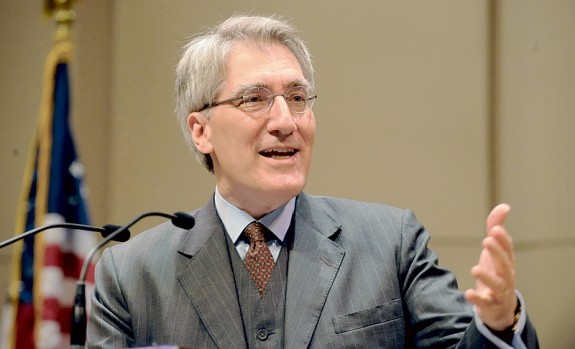
Dr. George prefaces his talk by suggesting that the classical schooling movement is important for preserving the constitutional structure of our American government.
He is speaking about ruling. Even in a liberal democracy we have “rulers” and we are “being ruled”. In a constitutional society, rulers are bound by structures such as voting and term limits. But they also rule. They make the rules and the rules are binding.
Rulers are sometimes called “public servants.” In what sense are rulers servants?
He points out that rulers do rule, even in a republic. Ruling is a practical necessity even if we had morally perfect members. Ruling is a moral necessity because the ruler is to serve.
What does the ruler do to serve society? He serves the common good and prevents injustices.
Justice aims for the common good. Is the common good an intrinsic good or instrumental good? The common good is instrumental not intrinsic. It serves the intrinsic goods of family, church, and other segments of civil society.
He explains the principle of subsidiarity: that the smallest unit of society should do as much as it can do. The larger units should do what they can, but no more. The nation-state should take care of protecting us from nuclear warfare, for instance, because no family or organization can do that. The nation-state should not provide healthcare or education for every citizen, because that good aim can be provided by smaller segments of society.
The state cannot monopolize education. The common good requires limited government because the common good can only be achieved by less-than-state structures such as families, private associations, and schools.
State monopolizing of health care, health and diet, education, or anything else is unjust. The bottom-up associations of civil society increase the health of society and also of government.
State monopolies can render civil institutions impotent to resist state (lack of) authority.
Constitutional constraints (written on the page) are important: Separation of powers; enumerated powers; federalism are very important constitutional constraints. However, George says, constitutional constraints are only effective insofar as they are supported by the people who make up the society. They have to understand and value those constraints. They have to resist government overreach even when it seems to be offering quick fix solutions.
Resistance to government quick fixes requires virtues. Virtues are strengths, habits.
George quotes Madison: “Only a well-educated people can be permanantly a free people.” He says that even the madisonian system of checks and balances “aren’t worth the paper they are printed on” if people don’t understand and value them in the face of temptation.
Virtue is needed. Control of people by government is needed as well as control of government by itself, or by the people.
The government will always exist who wants to bribe the people with free stuff, shiny apples. So how do we create a populous who can resist that temptation?
Here we see the central political role of the family, the religious community, the school. These are devoted to the inculcation of knowledge and virtue. Private, often religiously-based institutions are necessary for the transmission of virtue. They assist the family in forming virtuous young people who can be good citizens.
In any society where the traditional family dissolves, physical, spiritual, emotional, and civil maladies multiply. Where government expands to do the roles of civil society, the family and civil society disintegrates and the limited government becomes impossible.
The actual existence of virtue in the society is the only way the government rulers can actual become and remain servants.
“You can have morality without religion. But you can’t have morality in large groups, sustained over time, across generations, without religion.” – Robert George (slightly paraphrased) at the ACCS “Repairing the Ruins” Conference 2017
Thursday, 11:10am – John Mark Reynolds “Avoiding the Temptation of Christian Leninism”

John Mark is talking about the cultural shifts that happen about on the 70 year marks.
He suggests that if we lose, we must lose cheerfully. And if we win, we must win cheerfully.
Saruman’s temptation is to compromise to win. The Utopian temptation is to never compromise, and to throw reality under the bus. Christians are utopian in the sense that we pray “thy kingdom come” and mean it; we are waiting for the King. In the mean time, however, it is easy to see that his kingdom is not of this world.
Although Christians might be tempted to illicit utopianism, we are more often tempted to Leninism: “By any means necessary.” Leninism compromises its message by its method.
The tool shapes the soul of the person using it. Those who perpetrated the white terror in Russia became impotent to form an effective Russian existence in exile because they had lost their moral authority.
Christian schools compromise when they use “Great Books” but don’t use “The Great Book”, the Bible. Or when they are dishonest about their achievements. Or when they use Bible verses out of context like “the fool says in his heart, ‘there is no god.’” To exaggerate and lose our integrity.
Sarumon tried to compromise and use any means, like Lenin, to get the ring. But we must destroy the ring, although we know that we cannot.
Reynolds argued that no one will save education or save this generation in a time of turmoil if we do not. He said, “The eagles are not coming. Or rather, you are the eagles. And only God can destroy the ring.”
Thursday, 10:10am – Tim Griffith “Teaching Meaning in Language”
For this session, I had to choose a path. I chose a presentation having to do with teaching language because I’ll be teaching Ancient Greek in fall 2017.
BRIGADE ROOM: Tim Griffiths is a Latin teacher at New Saint Andrew’s College. He is talking to us about teaching meaning, rather than simple translation of “equus” to “horse” in another language like Latin.
He’s taught many age-levels and grades, from children, to middle and high school, to college, including adult learners.
He says that most people teach meaning by offering “English equivalence.” For example, the teacher might say “Amo” means “I love”. The student feels comfortable, the teacher feels competent.
But “amare” in Latin has all the worst connotations of love, the kinds of love Ovid likes to write about.
He says Latin dictionaries were written by Englishman in the 1700s.
Some words have changed: “Corn” in 18th century English meant “grain”.
“Phero” means “bear” (as in “carry”) but “bear” is becoming archaic.
Latin has no word for an “owl”. We have an idea of owl, a class of birds, that hoot, that look the same within a range. Latin has a bunch of words for various classes of birds.
“Aquila” applies to eagles but also vultures and raptors.
“Lentus” means “slow, sticky, flexible.”
“Quinam” doesn’t mean anything in Latin, it has a use. “of course” or “yes” or “indeed”. Really, it is used to underline emphasis.
“Puer” means “boy” – or “child” (or sometimes “slave”, in Cicero, for example.)
What’s the solution?
Switch the order. Teach them some English, and ask them “How would you say that in Latin?” You teach the concept or concept cluster first (using English) and then attach the Latin words.
“Boat” can be a vessel, large or small, and a verb “to boat”. There are Latin words for each of those concepts. “Chaffe”(sp?) = small boat; navus = boat; navigare = to boat or navigate.
To teach the dative, he presents a situation, where we talk about the indirect object for 10 minutes, then show how to do Latin. Then try to use it.
“Ecce” does something – it doesn’t just mean ‘behold’. It could also mean, listen, pay attention.
Thursday, 9:30am – Break – Douglas Wilson and Courtney Palumbo
I ran into Douglas Wilson, pastor, writer, author, blogger, and godfather of the classical education revival, and he was gracious enough to grant me an interview. I didn’t have a cameraman so it was a “selfie” interview… I’ll post that as soon as I get it edited.
I also ran into my friend Courtney Palumbo of Regents School in Charlottesville. Check out the amazing things they are doing there in Virginia.
Thursday, 8:30am – George Grant “Reformation and Revolution”
George Grant is speaking about the connection between two historical events: Protestant Reformation and the Association of Classical and Christian Schools. This is year marks the 500th anniversary of the Reformation and the 25th anniversary of the ACCS.
Grant is eloquently contrasting reformation with revolution; revolutions like the French revolution, the Prussian revolution, Bolshevik revolution, and our own sexual and cultural revolution aim for quick fixes by razing to the ground centuries of tradition. Reformation is a slow, steady, faithfulness in one direction intended to restore a lost tradition.
(While the Catholic, Orthodox, and high church Anglicans in the audience might be less-than-enthusiastic about the Reformation, Grant’s definition of restoring tradition sits well with this Orthodox Christian. Regardless, Grant is playing to the majority crowd of Protestants.)
Grant summarizes the life of Luther and Calvin and the apparently insignificant achievements of the first pioneers of the movement.
He argues from the French author Domine(sp?) there are four phases of a movement:
- Pioneers – jeremiads, fulminations, controversies (Luther)
- Foundations – Nehemiahs, depth, pastoral care, dogmatics (Calvin)
- Institutional – financial and administrative stabilization, political interests, mainstreaming, also a faltering of clarity, a mission drift (?)
- Maturity – a return to the pioneers and foundations, a rediscovery of the substance of the earlier days, characterized by real humility (Puritains)
Many ACCS schools are in phases 1-3. Our challenge, Grant says, is to find our way through this circuitous route to the maturity phase.
Grant says that genuine education is always a form of repentance.
We must strive for semper reformanda, constant reformation. We have received a stockpile of goodness, truth, and beauty. It takes humility to hold that securely, to hold it precious.
Grant notes that some in the audience are tired, weary, and who are giving classical education “one more shot.” He quips that “maybe it’s time for, I don’t know, the Benedict Option.” But all we have to do to change the world is just “the next right thing.”
Thursday, 8:15am – Orientation
The ACCS administration hosted a playful “metaphor contest”, awarding rhetoric books to the student who could craft the most poignant, funny, insightful, and surprising metaphor in a single sentence. The winner was:
“His excuse for being late was like his toupee; patchy, inadequate, and not fooling anyone.”
Thursday, 8:10am – Vendors
There are also venders a-plenty.
I met Kirby from CLT, the “Classic Learning Test”, a relatively new alternative and competitor to the SAT/ACT. I’ve heard of the test and already found it intriguing, but Kirby closed the sale. I’m buying a student study guide to pitch to my administrators at my school.
Thursday, 8:00am – First Impressions
Looks like an impressive turn out. More than 500, I’d guess around 1,000 attendees.
The younger folks manning the conference registration table ACCS staff, and college students from Grove City College and other classical colleges. Everything is professionally done.
Thursday, 6:00am – Airport
I caught some shut-eye on the overnight flight but it wasn’t the best night of sleep in my life. Feeling a little upside down.
It’s 3am to my body, but I’ve freshened up and changed at the airport. Headed to Pittsburgh and the Wyndham Grand Hotel!
Interviews
Update: Doctors Markos and George, and Andrew Kern have agreed to do interviews. Should be fun! Also, I was able to catch Douglas Wilson for a few questions.
First Announcement
If all goes well, I’ll be live-blogging some of the conference sessions as well as interviewing some of the speakers and participants.
The keynote speakers include Louis Markos, John Mark Reynolds, Robert George, Andrew Kern, Christopher Perrin, and Douglas Wilson.



